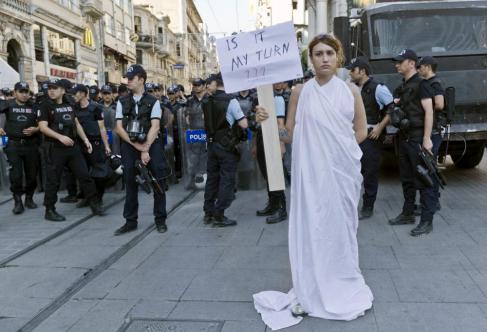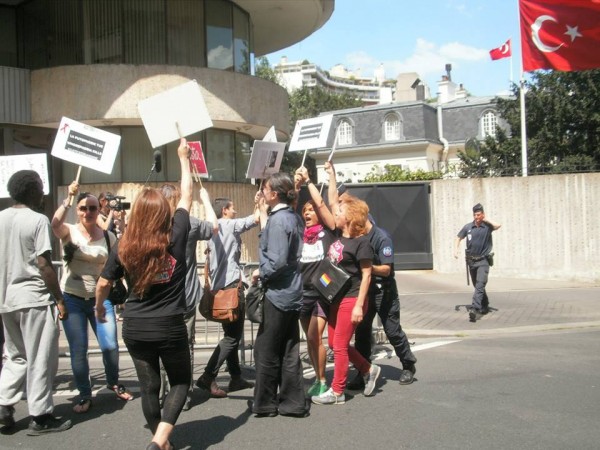
On July 2nd, 24-year-old trans sex worker Dora Oezer was murdered by one of her clients. On July 12th, there was a protest against transphobic violence Istanbul, while similar protests were held in Berlin and Eskisehir. Meanwhile, the Turkish sex workers’ rights organization Red Umbrella Sexual Health and Human Rights Association held a protest and read a press release in Ankara. On the 19th, Dora’s murder and the murder of Swedish sex worker Petite Jasmine inspired an international wave of protests against violence against sex workers in thirty six cities across the globe outside of Turkish and Swedish embassies. Kemal Iffetsiz Asyu Ayrikotu, chair of the Red Umbrella Sexual Health and Human Rights Association, answered some questions about Dora’s murder and conditions for trans sex workers in Turkey for Tits and Sass.
Caty Simon: Do you mind giving us some background on how the laws operate in Turkey re: sex work and what it’s like for sex workers there?
Kemal Iffetsiz Asyu Ayrikotu: Sex work is not illegal in Turkey, at least in theory. The only group of people who are registered are female sex workers who work at brothels which are regulated by a special Charter called “The Charter to Combat Prostitution.” Based on this legislation, several brothels operate in different cities of Turkey. The overall number of brothels and registered female sex workers who work at these brothels has changed in the last 10 years, as many brothels have been closed down. Currently, around 1500 registered sex workers work at these brothels, while the number of brothels has decreased to around 35 – 40. Both cisgender female sex workers and transsexual women can work at brothels as they both hold female ID cards.
The important issue is unregistered sex workers. These workers face a challenge coming from The Charter to Combat Prostitution, Turkish Penal Code and some laws that has nothing to do with sex work; such as the law on misdemeanors and the law on traffic. The charter gives authority to governorships, the higher local administration which governs cities in Turkey, to carry out investigations on people who do sex work in their apartments, bars, clubs, etc. and to close down these spaces for certain periods of time. The governorships, commissions assigned to combat prostitution under the governorships, and the police are the implementing bodies of the Charter.
The Turkish Penal Code is a big barrier for unregistered sex workers, as several phrases in this law target sex workers, such as the clauses on “obscenity”, “exhibitionism”, “providing a space for prostitution”, “soliciting”, “acting as mediators”, and “human trafficking.” All of these clauses are actively used against male, female, and trans sex workers, who end up with their apartments closed down, imprisoned, paying exorbitant fines, etc.
The police are some of the main perpetrators of human rights violations against sex workers, especially street sex workers. They make use of misdemeanor laws to harass sex workers on the streets by charging them with arbitrary fines every night. This is perceived as a strategy to deter people from sex work. Yet, when a sex worker is fined, they are more likely to go back to the street to re-earn the money which was taken away from her/him. Also, the law on traffic is used against those sex workers who drive down the streets to find clients, and they also end up charged with arbitrary fines.
Caty: Richard Köhler, from Transgender Europe, was quoted saying: “Unfortunately, Dora is not a rare case, there is a systematic murdering of trans people in Turkey, some even call it a trans massacre.” Kaos GL and Pink Life LGBTT Associations in Ankara noted that many murderers of trans people are not found or are sentenced to minimal punishment, often defending themselves by saying they were provoked in a “trans panic defense.” Can you comment on that? What is the status of trans people’s rights in Turkey?
Kemal: In many murders that had taken place in Turkey, we witnessed the the perpetrators arguing that they were offended by the murdered trans sex worker, as the sex worker offered to have active intercourse with the perpetrator. In other words, the trans sex worker allegedly demanded that the perpetrator be “passive”. Well, both from my own experience and from the experiences of many trans sex workers, we know that this is not demanded by us but by the perpetrators! Many of our clients pay us to be “passive” during intercourse, and yet they always deny this fact later. However, during the murders, this has not been the case. We have even witnessed a perpetrator of the murder of a transsexual women arguing that he was offended as the transsexual women wanted to be ‘active/top’ during the intercourse. Well, that’s just funny. We are professionals, we do what our clients ask us to do (within reason). We do not fuck people for our own pleasure at work. The perpetrators and their lawyers use this argument as a transparent attempt to receive a decreased sentence, as they think the courts will grant them “heavy provocation” decreases.
Regarding the rights status of trans people in Turkey, it is easy to say that we have no rights! There is no protection for us by law—no hate crimes legislation and no anti-discrimination code that covers trans people. Also, there is no constitutional protection. Violence is high, especially from the police, clients (as almost all of trans women are sex workers) and gangs. In many cases, perpetrators of violence (especially if they are the police) can operate with impunity. Courts are prejudiced. Access to many services, like education, employment other than sex work, health services, housing is very limited due to discrimination. Etc, etc, etc.
Caty: I’m familiar with the transmisogynistic phenomenon that forces many trans women into sex work because they aren’t accepted by employers in other industries (though in the US and Europe recently there has been a slow thawing effect which has finally allowed trans women some participation in “straight” professions). Would you say this phenomenon is more pronounced in Turkey, and if so, why?
Kemal: As long as it remains a vicious cycle for trans women to end up in sex work and as long as they quit school, often because they are forced to quit school because of transphobic attitudes; no one in society will think that trans women are fit for any kind of “regular” profession. In Turkey, when a person says “travesti,” the connotation is “sex worker.” So a trans woman is automatically a sex worker in the eyes of the people. And a sex worker cannot be trusted, cannot be hired as a worker in any profession outside of the sex industry, etc. If you want to work at another job, then this may be most possible in the entertainment sector. That’s it. Turkey is a conservative country and conservatism in Turkey is mixed with an orthodox understanding of Islam, patriarchy, and heterosexism. Trans people are sinful “perverts” according to this framework. Because trans sex workers are visible to society only at night, and only in certain places (such as the streets of unofficial red light districts) and since we are portrayed as negative figures in the media, prejudices continue to prevail.
There are very few alternatives for us apart from the sex industry, and those alternatives are mainly in the entertainment sector. People like to see travestis on the stage entertaining them—I guess they see us as funny or they like us to visibilise their subconscious selves on the stage on their behalf, as they cannot do this, they hide their true selves, but we can, as we are so openly radical, funny, interesting, sympathetic and clever. There are very few trans women who try to continue their education and finish university and look for jobs outside sex work. Many trans sex workers have finished their degrees but they end up doing sex work anyway, as it’s difficult for them to find a job in their field. Social life, the employment sector, and societal attitudes are so harsh that many trans women are trapped in isolation and exclusion and unable to graduate, or even if they do graduate, unable to find employment. All this just because we look different than other men and women.

Caty: On the 12th, a hundred plus people protested against transphobic and homophobic violence in Dora Oezer’s hometown. Why do you think the fact that being a sex worker made her even more vulnerable to violence has so far been ignored outside of the movement?
Kemal: I have been fighting for the inclusion of this issue in the discourse of the LGBT rights movement in Turkey. Activists think that trans people are murdered just because they are trans. I keep on stating that this is not the case. Dora was murdered mainly because she had no protection from violence, because sex work is not regulated in a manner that provides meaningful protection for sex workers. Yes, she was a trans woman and therefore she was a sex worker; however we cannot argue that the murder was only motivated by transphobia. It was both transphobic and whorephobic. When you look at the press statements of other groups on Dora’s murder, you note their sole focus on her trans identity —which is not the right way to frame the issue. Red Umbrella’s press statement is the only one that includes both the transphobic and whorephobic character of this murder, the only one which details how the current legislation around sex work results in the murders of trans women. I think the LGBT rights movement should quit being so mainstream and base themselves more on the ground when discussing the realities of trans women’s lives in Turkey. We live in a country where even gay men are targeted by prejudice against prostitution and our gay activists still focus solely on the homophobic character of these policies. This is not a logical strategy.
Caty: Did anyone in the sex workers’ rights community in Turkey know Dora? What was she like as a person?
Kemal: Of course. She also lived in Izmir and activists knew her well. She was a very great person in the sense that she never fought with anyone in the the community and she respected everyone. She was not politically active. All she wanted was to earn her living through sex work, as this was the only tool provided to her by the system.
Caty: What is the status of the investigation into Dora’s murder? Do police have a suspect? Are the police giving the case the attention it deserves?
Kemal: The perpetrator was detained and arrested only a day after the murder. As far as we know, the police are carrying out the investigation in a careful manner.

Caty: What factors do you think contribute to transphobic and whorephobic violence in Turkey?
Kemal: All the above factors: prejudice against trans women and sex workers in society. Ignorance within the government, local authorities, the police, and the courts. Transphobia which pushes almost all trans women in the sex industry, which totally lacks any protection for sex workers. No legislation to protect sex workers, but plenty of legislation targeting them. Ignorance within mainstream human rights circles. Distortion and falsehoods in the media and negative media portrayal of sex workers. ETC.
Caty: Thirty six cities worldwide held Justice for Dora/Justice for Jasmine demonstrations on the 19th outside Turkish and Swedish embassies. What else can the international sex workers’ rights movement do to honor Dora’s memory and prevent other trans sex workers from meeting her fate?
Kemal: I think it is [people from the] U.S., those people who have been in the sex industry, that can bring change, together with our friends and allies from abroad. Apart from the demonstrations, people can send letters to Turkish embassies. These letters can be jointly prepared letters in each country. Also, international NGOs can draft and send joint letters to the Turkish government, clearly stating that this violence must stop. You can also organize the media around you to get in touch with sex workers in Turkey—not with other parties that might want to speak for us—so that an accurate portrayal of what’s been going on in the country can be achieved and visibility can be increased. Our friends can consistently mention what’s going on in Turkey in their events and conferences and can invite sex workers from Turkey to speak about the realities they face. So, we need visibility and awareness on all fronts, and pressure on the Turkish government!
Caty: If sex workers all over the world learn only one thing from Dora’s murder, what should it be?
Kemal: That trans sex workers are really marginalised and ignored in all aspects of their lives! This is the case even within the sex workers’ community. These murders should make us understand that we should come together, not stand apart as disparate sex workers’ rights groups!

Slight correction: the woman holding the sign ‘Am I Next?’ is located on Istiklal Street in Taksim, Istanbul. Not Kusadasi
Thank you! My mistake came from misreading this page: http://www.qx.se/samhalle/24088/protester-i-turkiet-mot-hatbrott
Fascinating and sad. thank you for the post and interview.
The scum we live amongst in this world is vile! What a beautiful girl, soon to have her life taken because of one imbecile! Makes me sick…